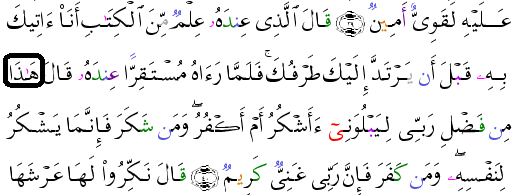بسم الله الرحمن الرحيم
BismillahirRahmanirRahim
This Week’s High Frequency Word of The Noble Quran Week – 1 ’12
Session 1 High Frequency Word of the Noble Quran
1″كَيْفَ”3 “هَذِهِ”2 “هَذَا”
=====================================================
1 – هَذَا / “haza”
means “this” [for male]
Example from the Quran: “قَالَ هَذَا مِنْ فَضْلِ رَبِّي”
Transliteration: “‘qala haza min fadli rabbi”
English Translation: “And he (Sulaiman) said: This is from my Creator” 🙂
Malay Translation: “berkatalah ia: Ini ialah dari limpah kurnia Tuhanku,” 🙂
Conversational Model:
Q: Who is this? س: مَنْ هَذَا؟
A: This is my friend, he is an engineer ج: هَذَا زَمِيْلِيْ، هُوَ مُهَنْدِس
From Surah An-Naml (27), Verse 40
Complete English Translation: [27:40]One with whom was knowledge of the Scripture said: I will bring it thee before thy gaze returneth unto thee. And when he saw it set in his presence, (Solomon) said: This is of the bounty of my Lord, that He may try me whether I give thanks or am ungrateful. Whosoever giveth thanks he only giveth thanks for (the good of) his own soul; and whosoever is ungrateful (is ungrateful only to his own soul’s hurt). For lo! my Lord is Absolute in independence, Bountiful.
Complete Malay Translation: [27:40]Berkata pula seorang yang mempunyai ilmu pengetahuan dari Kitab Allah: Aku akan membawakannya kepadamu dalam sekelip mata! Setelah Nabi Sulaiman melihat singgahsana itu terletak di sisinya, berkatalah ia: Ini ialah dari limpah kurnia Tuhanku, untuk mengujiku adakah aku bersyukur atau aku tidak mengenangkan nikmat pemberianNya dan (sebenarnya) sesiapa yang bersyukur maka faedah syukurnya itu hanyalah terpulang kepada dirinya sendiri dan sesiapa yang tidak bersyukur (maka tidaklah menjadi hal kepada Allah), kerana sesungguhnya Tuhanku Maha Kaya, lagi Maha Pemurah.
NOTE: It is very good remind ourselves to be grateful to Allah for our succes and accomplishments by saying “هَذَا مِنْ فَضْلِ رَبِّي / haza min fadli rabbi” telling ourselves that our success and accomplishments came from the grace of Allah s.w.t.— If you would like to catch the live online session of Language of the Noble Quran click the link below on Saturday Nights between (7th January 2012 – 10 March 2012) 7:30PM-9:30PM Singapore Time.
=====================================================
2 – ِهذِه / “hazihi”
means “this” [for female]
Example from the Quran:“وَلاَ تَقْرَبَا هَذِهِ الشَّجَرَةَ فَتَكُوْنَا مِنَ الظَّالِمِيْن”
Transliteration: “‘wala taqraba hazihisy syajarata fatakuuna minaz zholimin”
English Translation: “but do not approach this one tree, lest you become wrongdoers” 🙂
Malay Translation: “janganlah kamu hampiri pokok ini; (jika kamu menghampirinya) maka akan menjadilah kamu dari golongan orang-orang yang zalim” 🙂
Conversational Model:
Q: Who is this? س: مَنْ هَذِهِ؟
A: This is my friend, she is a doctor ج: هَذِهِ زَمِيْلَتِيْ هِيَ طَبِيْبَة
From Surah Al-Baqarah (2), Verse 35
Complete English Translation: [2:35] And We said: “O Adam, dwell thou and thy wife in this garden, and eat freely thereof, both of you, whatever you may wish; but do not approach this one tree, lest you become wrongdoers.”
Complete Malay Translation: [2:35]Dan kami berfirman: Wahai Adam! Tinggallah engkau dan isterimu dalam Syurga, dan makanlah dari makanannya sepuas-puasnya apa sahaja kamu berdua sukai dan janganlah kamu hampiri pokok ini; (jika kamu menghampirinya) maka akan menjadilah kamu dari golongan orang-orang yang zalim.
NOTE: The word الشجرة ended with ة, which is called تاء مربوطة an indication that the word is feminine in gender therefore هذه was used instead of هذا to imply the meaning “this”. is just one of several indications of مؤنث (feminine), we will learn other indications in future sessions. If you would like to catch the live online session of Language of the Noble Quran click the link below on Saturday Nights between (7th January 2012 – 10 March 2012) 7:30PM-9:30PM Singapore Time.
=====================================================
3 – َكَيْف / “kaifa”
means “how”
Example from the Quran:“كَيْفَ تَكْفُرُوْنَ بِاللهِ وَكُنْتُمْ أَمْوَاتًا فَأَحْيَاكُمْ؟”
Transliteration: “kaifa takfuruuna billahi wakuntum amwatan faahyakum?”
English Translation: “but do not approach this one tree, lest you become wrongdoers” 🙂
Malay Translation: “janganlah kamu hampiri pokok ini; (jika kamu menghampirinya) maka akan menjadilah kamu dari golongan orang-orang yang zalim” 🙂
Conversational Model 1:
Q1: How are you? س: كَبْفَ حَالُكَ؟
A1: I’m fine Alhamdulillah ج: أَنَا بِخَيْرٍ الحَمْدُ لِله
Conversational Model 2:
Q2: How do you know? س: كَبْفَ تَعْرِف؟
A2: The ustaz told me ج: أَخْبَرَنِي الأُسْتَاذ
From Surah Al-Baqarah (2), Verse 28
Complete English Translation: [2:28] How can you refuse to acknowledge God, seeing that you were lifeless and He gave you life, and that He will cause you to die and then will bring you again to life, whereupon unto Him you will be brought back?
Complete Malay Translation: [2:28] Bagaimana kamu tergamak kufur (mengingkari) Allah padahal kamu dahulunya mati (belum lahir), kemudian Dia menghidupkan kamu; setelah itu Dia mematikan kamu, kemudian Dia menghidupkan kamu pula (pada hari akhirat); akhirnya kamu dikembalikan kepadaNya (untuk diberi balasan bagi segala yang kamu kerjakan).
NOTE: If you would like to catch the live online session of Language of the Noble Quran click the link below on Saturday Nights between (7th January 2012 – 10 March 2012) 7:30PM-9:30PM Singapore Time.
=====================================================



